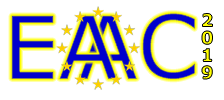Speaker
Christopher Arran
(University of York)
Description
High power laser facilities currently under construction will open up new accelerator applications, which will encounter quantum processes. Experiments such as Compton backscatter sources will require a thorough experimental understanding of non-classical behaviour. Recently, experiments have started to measure these effects in isolation by studying radiation reaction, using the collision between a PW-scale laser pulse and GeV electron beams from a laser wakefield accelerator. However, for these experiments to conclusively identify and understand these quantum effects, high quality electron beams and laser pulses are required.
We describe simulations of radiation reaction experiments using realistic parameters, already demonstrated at existing laser facilities, which would allow us to confirm the presence of quantum effects and establish the most suitable theoretical description. Using a Monte-Carlo model we determine the best measurements to make and the optimal laser and electron beam parameters. We conclude that whereas measuring the energy distribution of the emitted photons allows us to distinguish quantum and classical models of radiation reaction, measuring the electron energy spread is a better means of distinguishing between stochastic and deterministic models. In this case, we find that it is crucial to limit the initial energy spread to under 25%.
Primary authors
Christopher Arran
(University of York)
Jason Cole
(Imperial College London)
Elias Gerstmayr
(Imperial College London)
Dr
Tom Blackburn
(Chalmers University of Technology)
Stuart Mangles
(Imperial College London)
Dr
Christopher Ridgers
(University of York)

